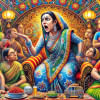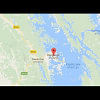Rangamati's culinary canvas: Where simplicity meets sophistication

As one leaves behind the energetic hum of Dhaka, a journey to Rangamati unfolds, like turning the pages to a quieter, more serene chapter in Bangladesh's culinary story. This is not just about eating; it's an exploration of flavours where simplicity reigns supreme and every dish tells a tale.
In Rangamati, the culinary approach takes a gentle detour from Dhaka's romance with robust spices. Here, the kitchen's philosophy is about understatement – where freshly sourced ingredients' natural flavours are spotlighted. It's a refreshing departure from the spice-intense culinary narrative that Dhaka so proudly narrates.

Bamboo-infused Wonders: A Rustic Rhapsody
In the heart of Rangamati, bamboo cooking elevates the humble chicken and fish to gastronomic art. Picture chunks of chicken and slices of fish, subtly seasoned, ensconced within bamboo shafts and slow-cooked over an open flame. The bamboo imparts a smokiness creating a flavour profile that's as unique as Rangamati's panoramic vistas. Eating this feels like unravelling a secret of the forest—primal, pure, and profoundly satisfying.
Egg Korma: The Creamy Confluence
The Egg Korma is a revelation. It's as if the eggs, bathed in a creamy, lightly spiced gravy are telling tales of Rangamati's understated elegance. Each spoonful is a reminder that sometimes the most profound flavours are born from the simplest of techniques, much like the effortless beauty of Rangamati's landscapes.
Binni Rice with Coconut: A Symphony in Every Bite
Binni rice is traditionally used to make pithas and milk-based Bangladeshi desserts. However, food and creativity go hand in hand when it comes to culinary magic in Rangamati. Binni rice, a local variety known for its distinctive aroma and flavour, becomes a canvas for culinary expression when paired with fresh coconut flakes. This dish, humble in its composition, is reminiscent of a leisurely boat ride on Kaptai Lake — soothing and soul-stirring.

Mundi: A Taste of Tradition
The Mundi is a succulent soup of rice noodles with a touch of chilli. We had the option of it being served to us in three different ways: fried, in a noodle soup, or combined with spicy chilli and chutney. We went for the third option. Prepared with indigenous ingredients, it is not just a dish; it's a culinary heirloom. Each spoon is a journey through Rangamati's rich heritage, an experience akin to leafing through a well-preserved history book.
Vegetables and Fish Korma: The Essence of Nature
The steamed vegetables, crisp and vibrant, alongside the Fish Korma, represent the art of letting nature shine in its culinary form. They capture the essence of Rangamati's verdant fields and bountiful waters, offering flavours as pure and refreshing as the region's morning dew-laden air.
The BBQ Fish: A Rustic Melody
The roadside barbeque fish pays tribute to Rangamati's rustic charm, perfectly cooked on simple skewers. The air was filled with a smoky aroma that presented me with the opportunity for spontaneous get-togethers with locals outside, around a fire. The uniqueness of this snack was its underrated simplicity. A fusion of crispy bites and tastes of smoky richness captures the essence of Rangamati's simple yet sophisticated food culture.

The Essence of Eating in Rangamati
In Rangamati, dining transcends the act of eating. It's about nourishing not just the body but also the soul. The cuisine here, in its unpretentious and wholesome form, enriches and soothes.
Moving away from Dhaka's vibrant but hectic food scene, Rangamati offers a culinary sanctuary. It's a place where the flavours are as honest and unassuming as the landscape is beautiful.
So, for those seeking a break from the rich, spice-driven culinary experiences of Dhaka, Rangamati is a breath of fresh, flavourful air. Here, in the simplicity of its food, lies the true beauty of taste and tradition.
Reel by Sabirul Islam Tanjil

 For all latest news, follow The Daily Star's Google News channel.
For all latest news, follow The Daily Star's Google News channel. 








Comments